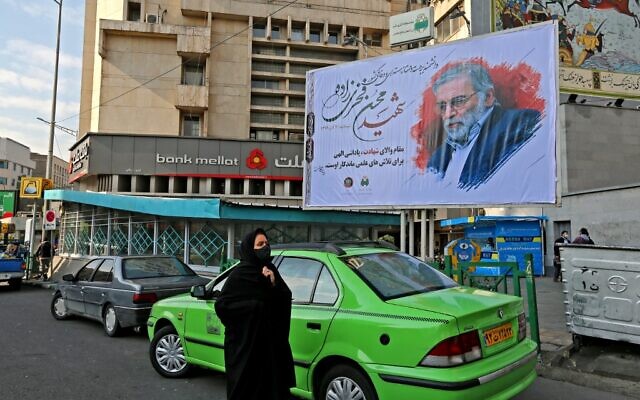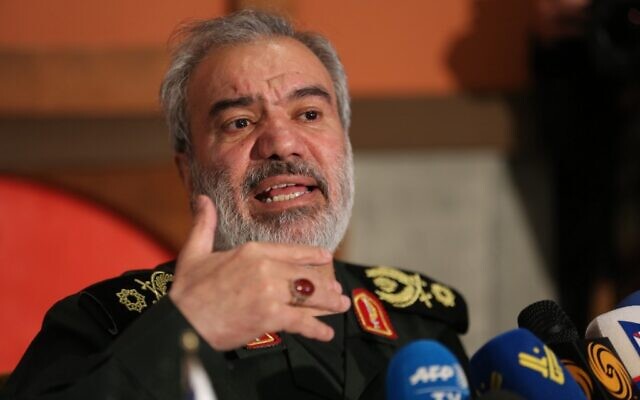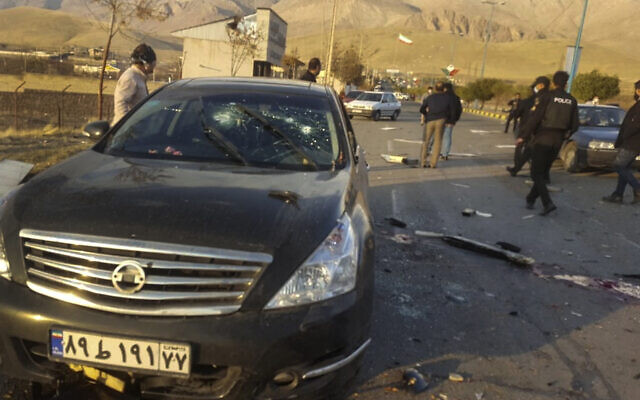
A satellite-controlled machine gun with “artificial intelligence” was used in last week’s assassination of a top nuclear scientist in Iran, the deputy commander of the country’s elite Islamic Revolutionary Guard Corps told local media Sunday.
Mohsen Fakhrizadeh, long regarded by Israel and the US as the head of Iran’s rogue nuclear weapons program, was driving on a highway outside Iran’s capital Tehran with a security detail of 11 Guards on November 27, when the machine gun “zoomed in” on his face and fired 13 rounds, said Rear-admiral Ali Fadavi.
The machine gun was mounted on a Nissan pickup and “focused only on martyr Fakhrizadeh’s face in a way that his wife, despite being only 25 centimeters (10 inches) away, was not shot,” the Mehr news agency quoted IRGC chief Fadavi as saying.
It was being “controlled online” via a satellite and used an “advanced camera and artificial intelligence” to make the target, he added.

Ali Fadavi, deputy chief of the Islamic Revolution Guards Corps (IRGC), delivers a speech during Basij Week in the Iranian capital Tehran on November 24, 2019. (Atta Kenare/AFP)
Fadavi said that Fakhrizadeh’s head of security took four bullets “as he threw himself” on the scientist, and that there were “no terrorists at the scene.”
Iranian authorities have blamed archfoe Israel and the exiled opposition group the People’s Mujahedeen of Iran (MEK) for the assassination. They have vowed revenge, though Israel has not publicly commented on the allegations that it was responsible.
State-run Press TV had previously said “made in Israel” weapons were found at the scene.
Conflicting accounts of the scientist’s death have emerged since the attack, with the defense ministry initially saying Fakhrizadeh and his bodyguards were caught in a firefight with several gunman, while Fars news agency claimed “a remote-controlled automatic machine gun” killed him, without citing any sources.
In an interview broadcast by Iranian state media on Friday, two of Fakhrizadeh’s sons said their father was hit by “four of five bullets” in the attack. Though they were apparently not with Fakhrizadeh at the time of the assassination, they described the incident as “like a war,” according to a translation by Israel’s Kan public broadcaster.
According to Iran’s defense minister, Amir Hatami, Fakhrizadeh was one of his deputies and headed the ministry’s Defense and Research and Innovation Organization, focusing on the field of “nuclear defense.”

The scene where Mohsen Fakhrizadeh was killed in Absard, a small city just east of the capital, Tehran, Iran, November 27, 2020. (The semi-official Fars News Agency via AP)
Fakhrizadeh was named by Prime Minister Benjamin Netanyahu in 2018 as the director of Iran’s rogue nuclear weapons project. When Netanyahu revealed then that Israel had removed from a warehouse in Tehran a vast archive of Iran’s own material detailing its nuclear weapons program, he said: “Remember that name, Fakhrizadeh.”
He was also an officer in Iran’s Islamic Revolutionary Guard Corps, designated by the US as a terrorist organization.
Israel has long been suspected of carrying out a series of targeted killings of Iranian nuclear scientists nearly a decade ago, in a bid to curtail Iran’s rogue nuclear weapons program. It has made no official comment on the matter.
Israeli officials have warned Israeli citizens traveling abroad that they may be targets of Iranian terror attacks in the wake of the killing, and cautioned former Israeli nuclear scientists they could be in Iran’s crosshairs.
No comments:
Post a Comment